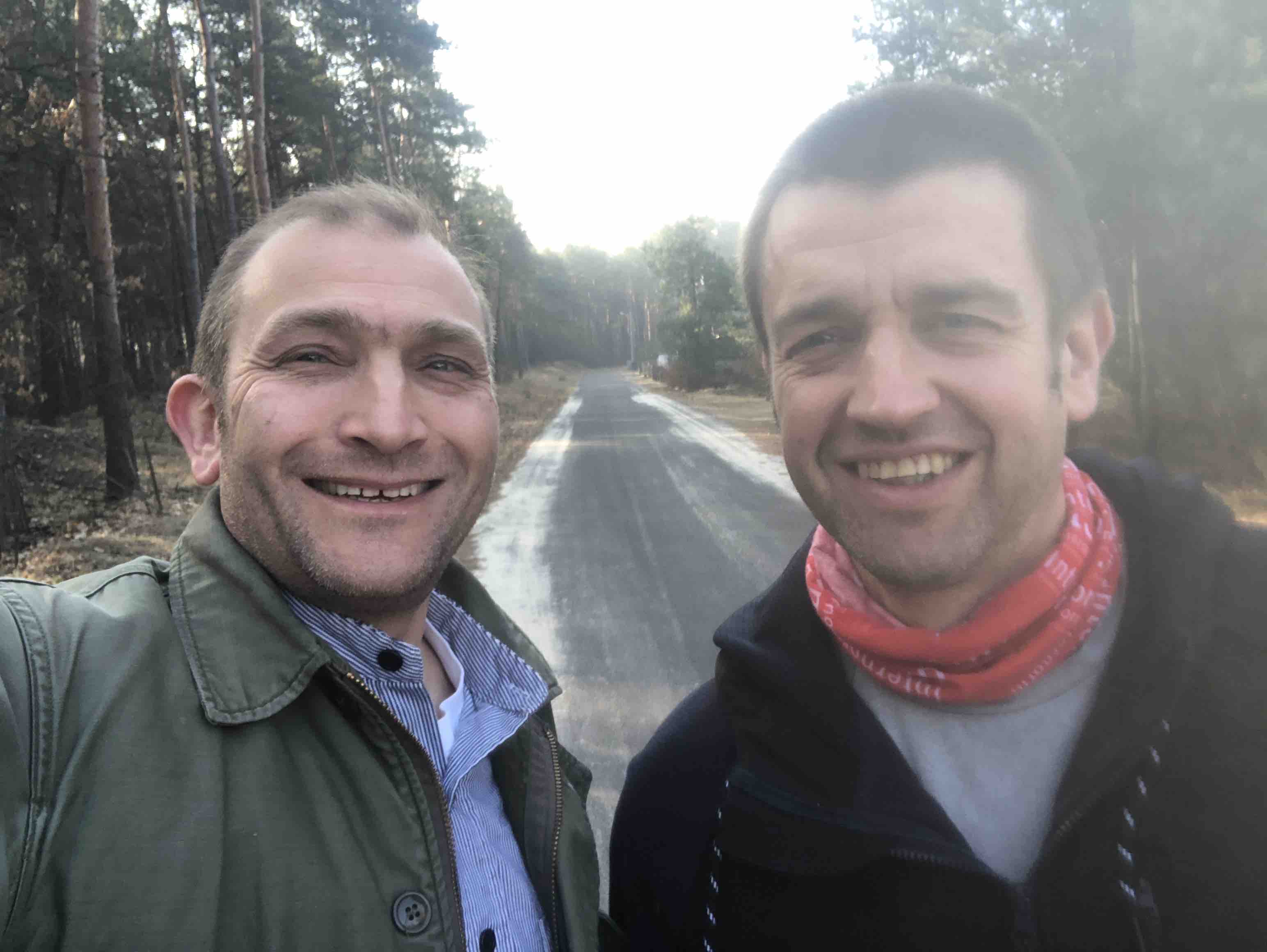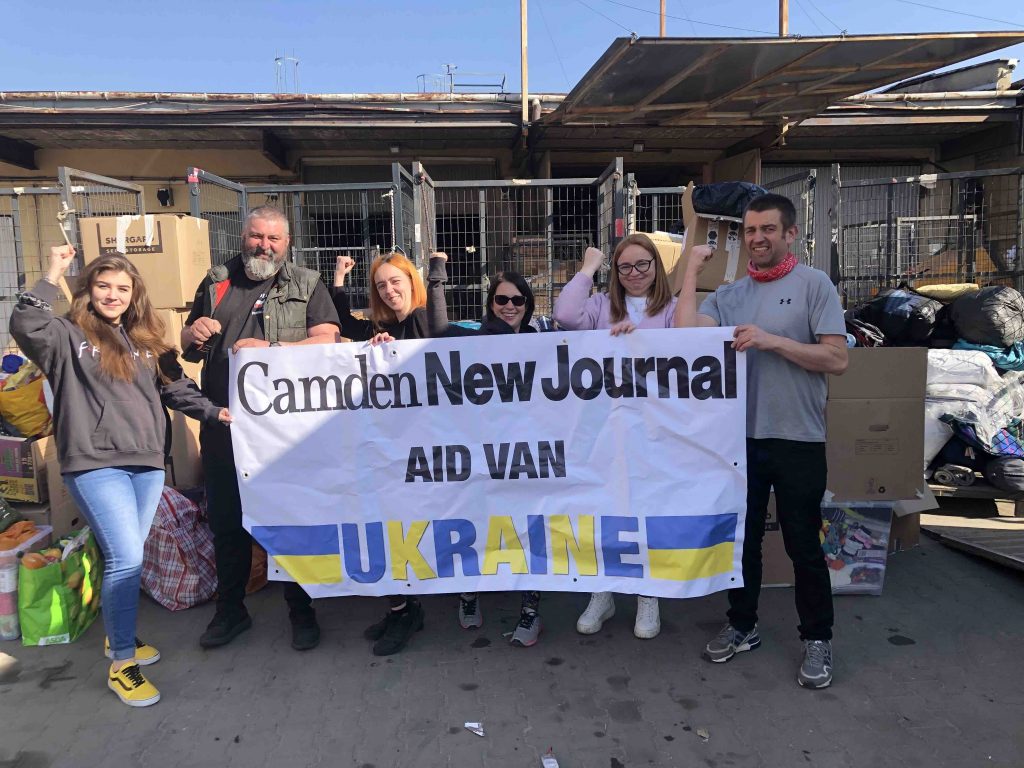CNJ Aid Van: Yes! We really did drive to war’s edge
Some things stay with you forever
Monday, 4th April 2022 — By Dan Carrier in Poland

Dan Carrier and Martin Smith went to Poland
SEE ALSO: CNJ AT 40: HELP US CELEBRATE OUR BIRTHDAY
– AND SUPPORT CAMPAIGNING JOURNALISM
CLICK THE DONATE BUTTON TO MAKE YOUR CONTRIBUTION
IT took less than a week to find a van, fill it up, and join the humanitarian response to Europe’s biggest refugee crisis since the Second World War.
In recent days, the team back home have been asked: Did the CNJ really go all that way?
But taking a van-load of supplies generously donated by our readers to where they were desperately needed was remarkably easy: the response to our a call out was breathtaking in its speed and generosity.
Then it was time to get our aid van – last seen sharing the help around here in Camden during the pandemic crisis – back on the road and ready for the drive across five European borders.
The aim was to make both us, as journalists, and you, as readers, feel a little less helpless as war rages in Europe.
It may be a drop in what’s needed but we took a message of solidarity from our corner of London to those who had fled with little more than the clothes they were wearing and whatever bag of belongings they could carry.
We cannot say thank you enough to all those who brought us supplies, from everyday basics such as soap and toothbrushes to bandages. They will be used by wounded residents in Ukraine having been taken into the country to help overloaded hospitals by our contacts.
Big or small, every donation was given with love and has helped someone in desperate need.
Drop-off points included our offices and the Dartmouth Arms in Dartmouth Park, where scores of people brought boxes and bags, packed with items drawn from a Red Cross list.
Our Camden Road office was also inundated, while Archway Market collected supplies from shoppers and stall holders.
Maybe we could have filled the van fives time over.
Firms got involved too: music company Key Production have a record printing plant in Poland, and as well as contributing to the expenses of the trip, it put the New Journal in touch with staff on the ground who were volunteering in their town to ease a humanitarian crisis of immense proportions.
Film company Fulwell 73 filled multiple boxes of essentials, ranging from baby products to mobile phone power packs. Alara Foods in Camley Street offered a one ton load of muesli, while Murphys, on top of providing the van, saw staff collect a range of supplies for us to load in the back.
One-off financial donations helped cover the fuel and allowed the van to be refilled with more supplies from shops in Poland once the first delivery of Camden donations had been completed.
Then there were the people who quietly popped past as we loaded up and left carefully packed boxes with handwritten messages tucked inside.
Then there were the individuals – from parents at Brookfield School in Highgate who organised a collection and helped load the van.
Also on board was Martin Smith. He lives in Scotland (he is my cousin) and got wind of the plan. He volunteered to share
the driving.

He had already set about fundraising large donations from his friends and colleagues at his place of work, Scotia Windows.
As well as providing company and moral support, it halved the journey time with a second pair of hands on the wheel.
We set off last Tuesday morning from Camden Town – the first leg was a 74 mile drive to the Euro Tunnel. The post-Brexit effect saw a five-hour queue to drive the van onto the train.
An accreditation letter from the Ukrainian Embassy, asking for the bearer – us – to be given every assistance, helped smooth our journey through customs and persuaded customs officials a possible export tax was not necessary.
We then headed across northern France, past Dunkirk and into Belgium and the Netherlands, marking our progress by noting the names of towns and cities on route that my team Spurs and Martin’s Celtic have played in second-tier European Cup competitions.
The signs of the situation to the East grew gradually.
From noting landmarks such as the Ghent football stadium bathed in yellow and blue lights to the signs of military movements as we reached Poland, every mile that took us closer to our destination, the tragedy that has unfolded became more real.
We stopped for a rest in Dortmund and then drove at daybreak towards the rising sun.
An unnaturally warm spring morning saw us reach deep into Poland last Wednesday and we arrived at the town of Olkusz by the afternoon, having navigated our way through scattered towns and cities on route.
It was after visiting Olkusz’s aid headquarters and the refugee response centres in Wroclaw with the offerings from Camden, that we collected the family we then helped on the return journey and whose story you will have read on the previous pages.
Needless to say, after the most harrowing few days, the creature comforts at home felt more welcome than ever.
Some things stay with you forever. The day we drove to the edge of war will be one of them.